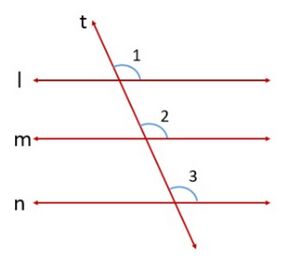एक ही रेखा के समानांतर रेखाएँ: Difference between revisions
From Vidyalayawiki
No edit summary |
No edit summary |
||
| Line 1: | Line 1: | ||
[[File:Transversal Line.jpg|alt=Fig. 1 - Transversal Line|thumb|Fig. 1 - Transversal Line]] | |||
If two lines are parallel to the same line, will they be parallel to each other? Let us verify. | |||
In the fig.1 line <math>m || </math> line <math>l </math> and line <math>n || </math> line <math>l </math> . | |||
Let us draw a line <math>t </math> transversal for the lines <math>l,m,n </math> | |||
We know that line <math>m || </math> line <math>l </math> and line <math>n || </math> line <math>l </math> . | |||
Hence <math>\angle 1=\angle 2 </math> and <math>\angle 1=\angle 3 </math> (Corresponding angles axiom) | |||
But <math>\angle 2=\angle 3 </math> as they are corresponding angles | |||
Therefore, we can say that line <math>m || </math> line <math>n </math> (Converse of corresponding angles axiom) | |||
This result can be stated in the form of the following theorem: | |||
'''Theorem 1''': Lines which are parallel to the same line are parallel to each other. | |||
[[Category:रेखाएँ और कोण]][[Category:कक्षा-9]][[Category:गणित]] | [[Category:रेखाएँ और कोण]][[Category:कक्षा-9]][[Category:गणित]] | ||
Revision as of 13:37, 28 June 2024
If two lines are parallel to the same line, will they be parallel to each other? Let us verify.
In the fig.1 line line and line line .
Let us draw a line transversal for the lines
We know that line line and line line .
Hence and (Corresponding angles axiom)
But as they are corresponding angles
Therefore, we can say that line line (Converse of corresponding angles axiom)
This result can be stated in the form of the following theorem:
Theorem 1: Lines which are parallel to the same line are parallel to each other.
